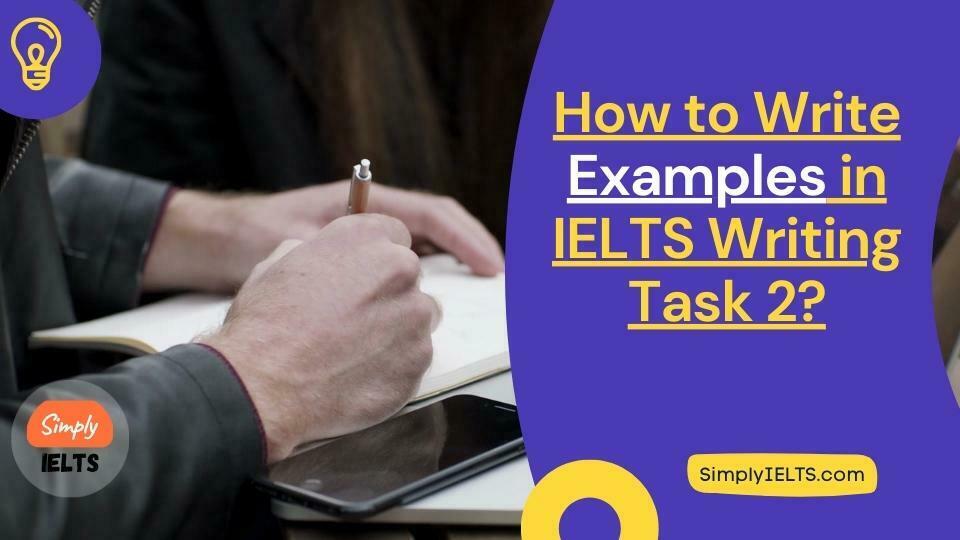How to Write Examples in IELTS Writing Task 2?

I was talking to a fellow IELTS trainer the other day. Apart from the usual discussion about our best students, she mentioned an anecdote about a student writing an inappropriate example in an essay she was correcting. I also shared some of my funny example stories.
But that got me thinking – it is not the points that students struggle with; it is giving examples that is not easy.
Examples cannot be avoided as they are criteria mentioned in the instructions. Still, somehow students can’t seem to crack it!
It is important to remember the function of the example. It helps to support the point you want to make, and it displays your ability to either state facts or write about your experiences.
Keeping these two things in mind is going to help you write examples that add value to your essay, instead of giving the examiner a chance to slash your band score.
Problems in examples in IELTS Writing Task 2
Examples are not an excuse to stash words.
I have heard many students share their secret to reaching word count with me – “just add all the words you need in the example!” I am sorry to say that it is also the best way to lose band scores in Lexical Resource for imprecise language. The example is not an area where one can tack on as many words as they might want.
Let’s explore some typical errors students commit while offering examples.
Problems with examples from Knowledge in IELTS essays
1. Authoritative examples which have no basis
Let’s say the essay is about racial discrimination. To make his or her point, the student gives this as an example, “according to a recent survey, 50% of Indian citizens are dark in colour”. The words ‘citizens’ and ‘in colour’ are inefficient choices as the same could be said as “according to a recent survey, 50% of Indians have dark skin.” Also, note that this statement is an overgeneralisation. There is no information about the credibility of the study, or where or when the study was done. Therefore, believing this statement as a fact is a little tricky. Adding a percentage does not make your statement credible, even if the statistic you have mentioned is accurate.
2. Generalised examples
In another essay about health treatments, the students may offer an example, “According to a local hospital in my town, 75% of the nation will fall sick in a month.” There are many problems with this sentence. This study has no credibility because the claim made by the local hospital cannot determine what may happen in the whole country. Instead, the student could have written: “according to my town’s leading hospital, 75% of its citizens have chances of getting malaria this monsoon.” The details mentioned in the sentence are much more detailed and precise, making the study sound more believable. A town’s leading hospital would be able to have enough data about different types of diseases in their vicinity to make this claim. If you want to write about the whole country, choose an authority that has a real capacity to look over the area.
Problems in examples from experience in IELTS essays
Let’s consider another essay about overpopulation. Consider, the point a student was trying to make was that because of the population explosion, we are fetching water at a higher rate, causing disturbed water input in the ecosystem. The example he chose was “in tenth grade, I went to visit my aunt’s house in Bangalore, and while taking a shower over there, the water went off.
That’s when I came to know about this problem.” You may observe that his point and his example had very little to do with each other.
This was an unsuitable example for the point he was making because there was no direct link. Instead, he could have said “in my home time, when I was a child, water in the well was much closer to us.
Now the water level in the well has fallen so far that even during monsoon the water levels don’t rise in the well. It dries up even more in the summer.”
With this example, there is a direct correlation in his described experience and the point he was trying to make. His point is about disturbed water input, and he writes about how his well does not fill up even in monsoon season.
Summary:
IELTS is not trying to assess your general knowledge skills. They want to see whether you can accurately communicate in English with English speaking audiences. All you have to do is make your experience and ‘knowledge’ sound believable. The examples don’t have to be real, but they have to correlate with your points. The best way to tick all the boxes is to
- give a credible, logical source for the scope of the statistic you want to provide.
- keep the experience to the point without adding too many words and show a clear correlation between the point and the example.





Responses